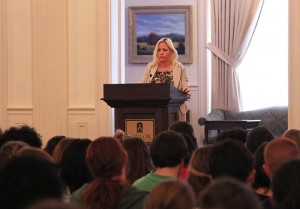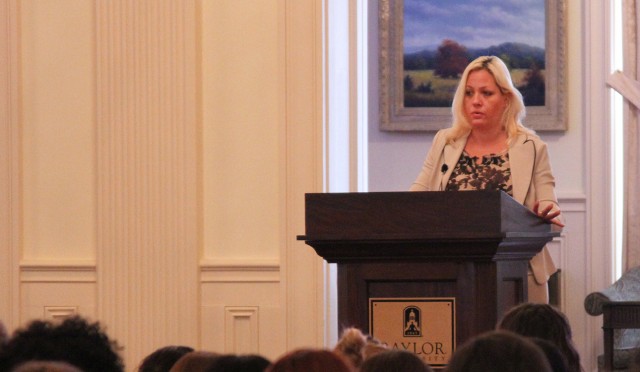
Monica Lake | Lariat Photographer
Reporter
Students packed the Barfield Drawing Room on Tuesday night to hear Kateriina Rosenblatt speak about her experiences with human trafficking.
“The message I want to bring today is this can happen to anybody,” Rosenblatt said. She gave the keynote lecture as a part of International Justice Mission’s Social Justice week.
Rosenblatt spoke about the first time she became involved in trafficking at the age of 13. An older girl named Mary approached her and offered her friendship.
“She was thin and pretty and everything I wanted to be,” Rosenblatt said. “I thought she was just a friendly person. A safe person.”
However, Mary was an exploiter. After they were friends for about a month, Mary tried to sell Rosenblatt to an older man in the hotel they lived in.
“Not every nice person is a safe person,” Rosenblatt said.
After the incident with the older man, Rosenblatt was drugged and left for dead by the trafficking ring in the hotel. She managed to get to a pay phone and dial 0 before passing out. She was found and saved.
“We didn’t report it to the police,” Rosenblatt said. “It was just something bad that happened to me.”
Rosenblatt’s experiences in trafficking continued until she was 17 years old. Saved at a Billy Graham Crusade as a child, she feels God saved her to rescue other people from trafficking situations.
Rosenblatt works with numerous organizations in South Florida to end human trafficking, speaks to kids about the issue and helps people in trafficking situations. She has served as an expert witness for the FBI and started her own organization: There is HOPE for Me Ministries.
“We tell kids: If there’s hope for me, there’s hope for you,” Rosenblatt said.
Rosenblatt advised students to be aware of fake modeling scams, often used as a front for trafficking operations. These types of scams are often on social networking sites such as Facebook.
“These scams are preying on people with low self-esteem and people who need money,” Rosenblatt said. “Be wary and check people out before you invest your time, your heart, yourself.”
She also advised students to pay attention to their friends and to believe someone if they say they are being trafficked.
“Please always believe them and then report it,” Rosenblatt said. “Most people don’t lie about this stuff. Who wants to lie about that?”
Houston senior Dalychia Saah, Justice Week Chair, said she thought Rosenblatt’s story was powerful.
“I love that we were able to get the story shared and debunk myths about human trafficking,” Saah said. “I hope people will be more open and sensitive to the issue.”
Freshman international studies major Lauren Hastings-Garcia, who also serves as the public relations chair for IJM, said the speech addresses one of the major issues for IJM.
“It inspires you to do more,” Hastings-Garcia said. “It makes you open your eyes to the things happening around you.”
Jesus Said Love, a local nonprofit, performed two songs after the speech and encouraged students to become involved in local efforts to reach out to victims of human trafficking.
If you think someone you know is being trafficked, the number for the National Trafficking Hotline is 888-373-7888.



